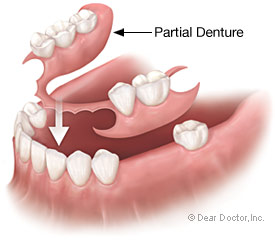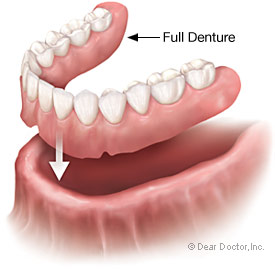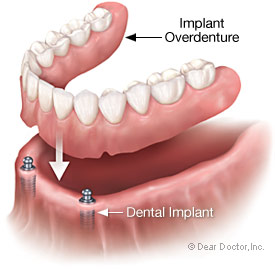A denture is a removable dental appliance replacement for missing teeth and surrounding tissue.
A Partial Denture not only fills in the spaces created by missing teeth, it prevents other teeth from shifting. Partial dentures attach to remaining teeth and have a gum-colored portion meant to blend into the existing gum, with prosthetic teeth to replace the missing teeth.
Complete Dentures are used when all of the teeth are missing. They are a total replacement system for either upper or lower teeth and, in some cases, both.
Overdentures are a newer alternative to dentures, combining traditional denture technology with modern advancements in dental implants. An overdenture is used for patients who still have teeth remaining or who will have implants placed. The retained teeth or the implants are used to help suport the overdenture. Although it is a more expensive option than a conventional complete denture, it offers a stronger biting surface,better fit and increased retention.
Dentures are very durable appliances and will last many years, but may have to be remade, repaired, or readjusted due to normal wear.
What does getting dentures involve?
The process of getting dentures requires several appointments, usually over several weeks. Highly accurate impressions (molds) and measurements are taken and used to create your custom denture. Several “try-in” appointments may be necessary to ensure proper shape, color, and fit. At the final appointment, your dentist will precisely adjust and place the completed denture, ensuring a natural and comfortable fit.
A Complete denture may be either “conventional” or “immediate.” A conventional type is made after the teeth have been removed and the gum tissue has healed, usually taking 4 to 6 weeks. During this time the patient will go without teeth. Immediate dentures are made in advance and immediately placed after the teeth are removed, thus preventing the patient from having to be without teeth during the healing process. Once the tissues shrink and heal, adjustments will have to be made.
It is normal to experience increased saliva flow, some soreness, and possible speech and chewing difficulty, however this will subside as your muscles and tissues get used to the new dentures.
You will be given care instructions for your new dentures. Proper cleaning of your new dental appliance, good oral hygiene, and regular dental visits will aid in the life of your new dentures.
Convenient Offices To Serve You
Colorado Dental Health are located up and down the front range of Colorado, so there is always a dentist close by to serve you. In Denver, we have three convenient locations: Downtown, Midtown and the Denver Tech Center. Our Westminster office serves the northern metropolitan area, and if you are in Boulder, Longmont or Greeley, there is a hometown Colorado Dental Health office at your service. Schedule a visit today.